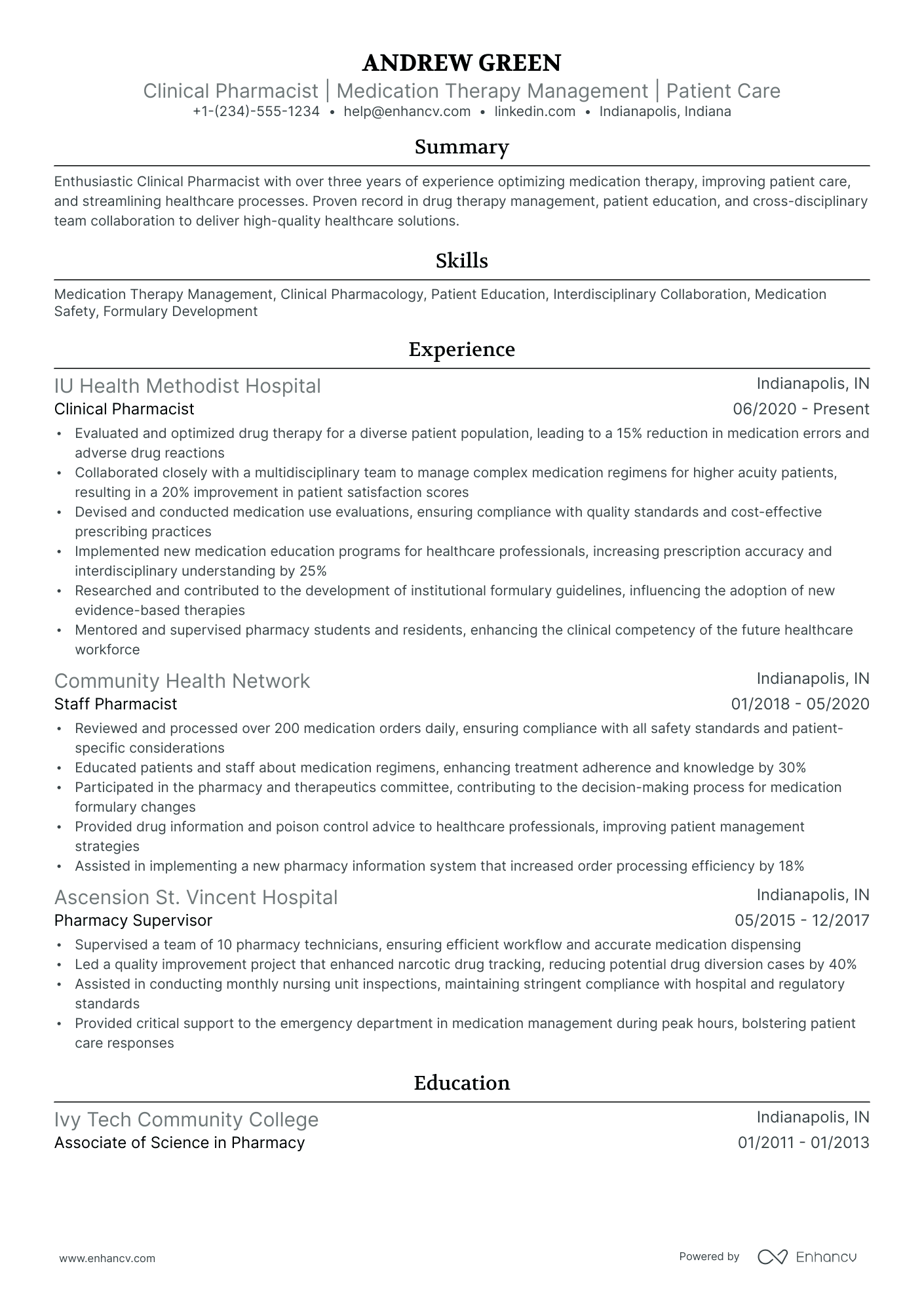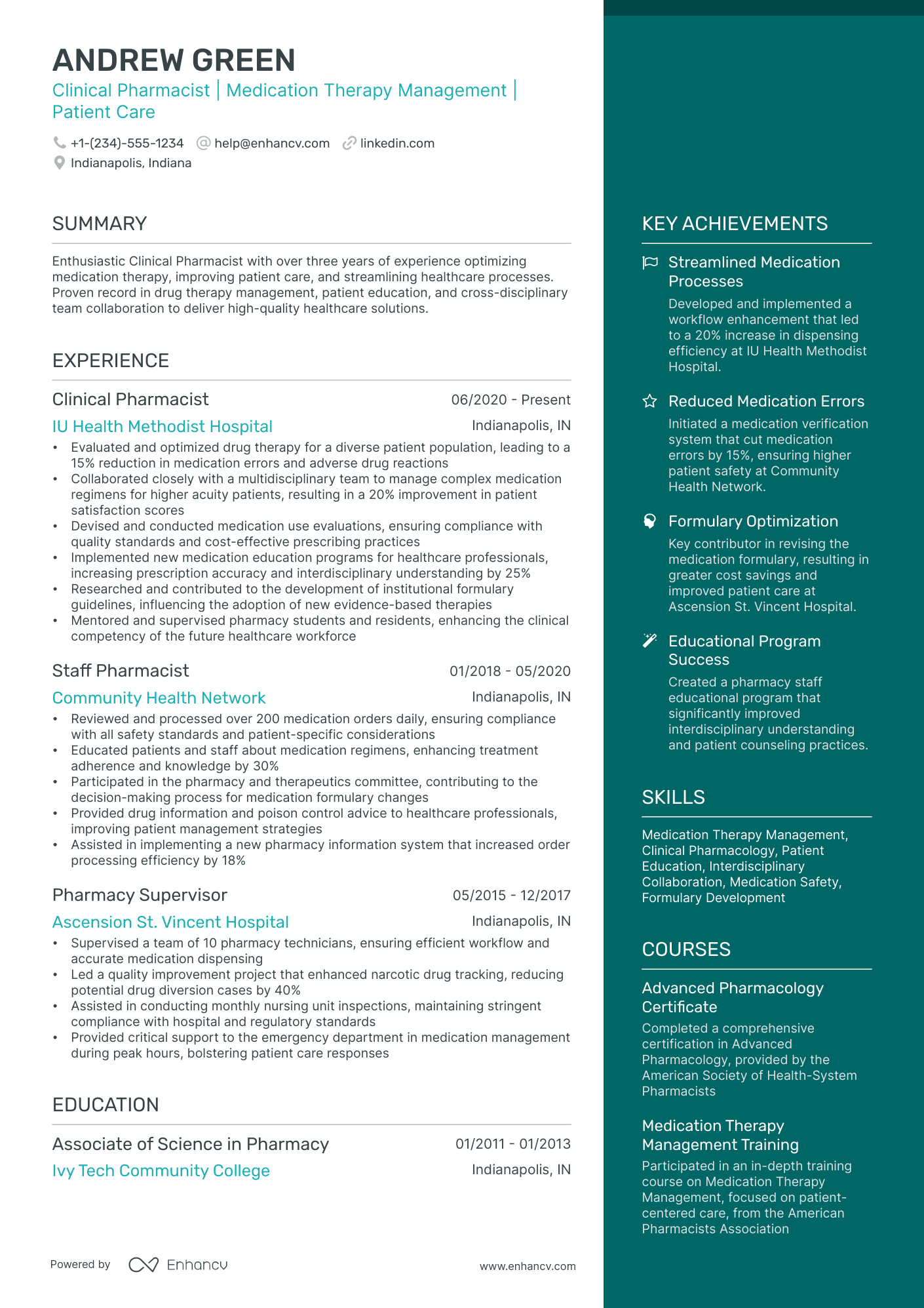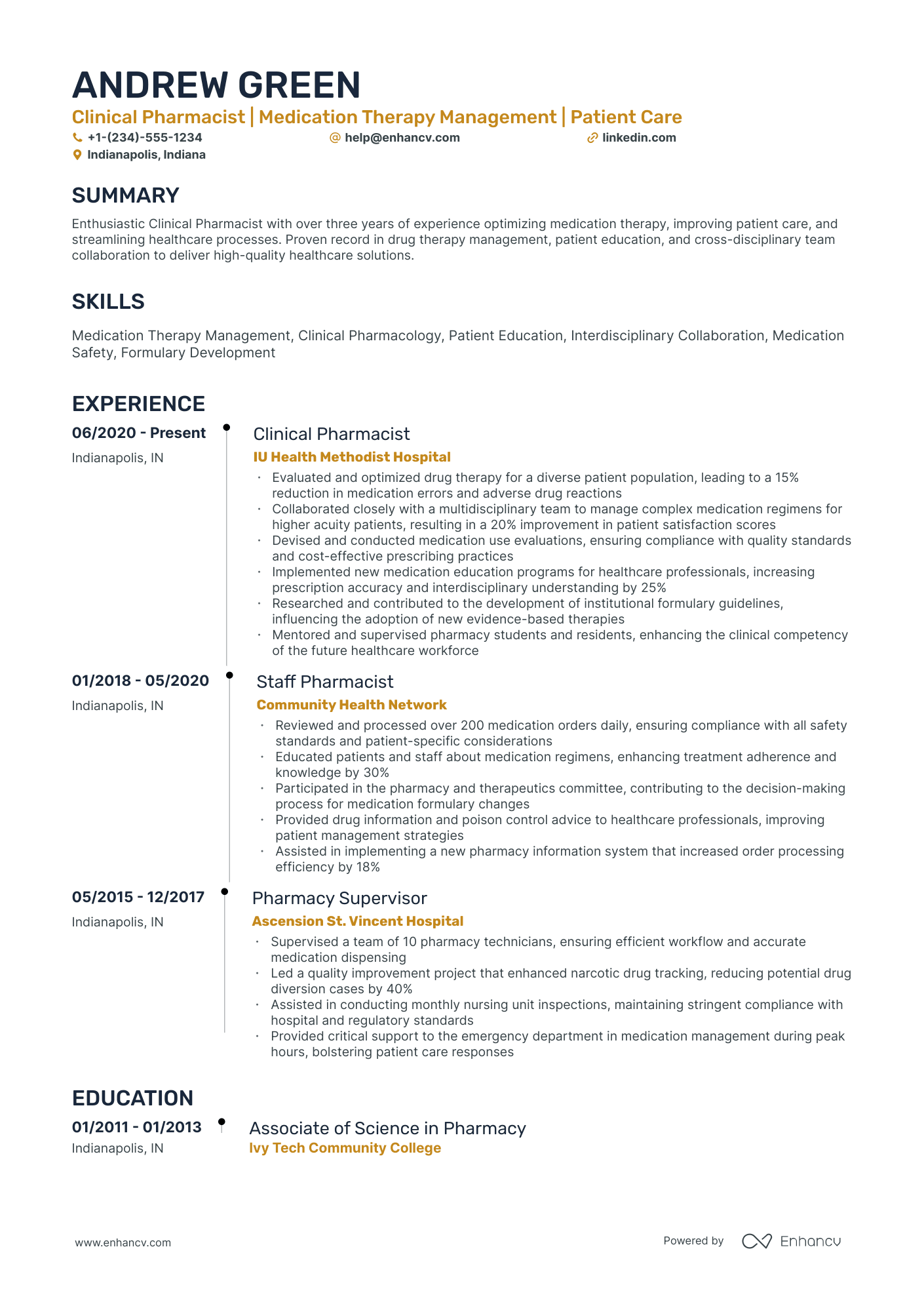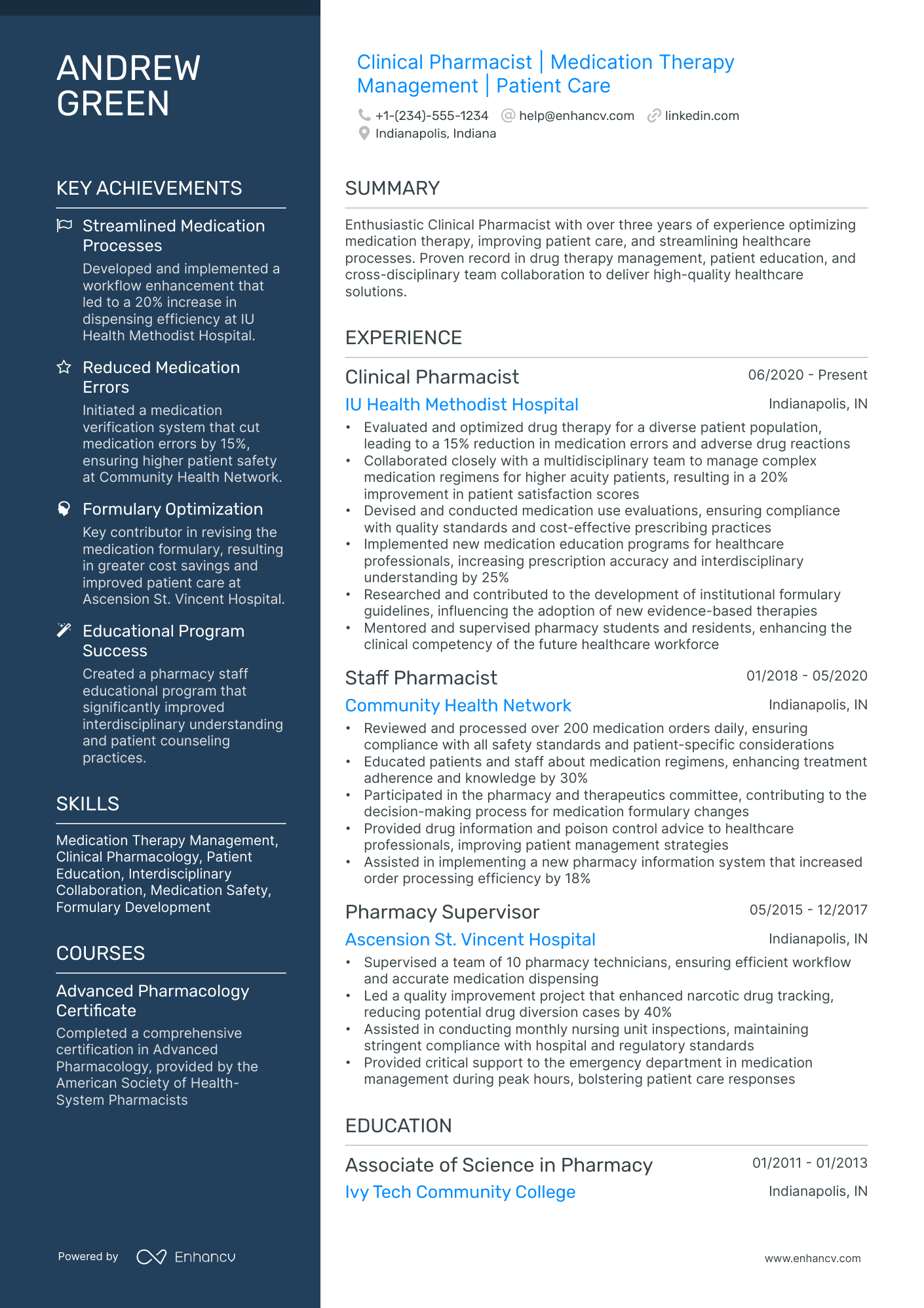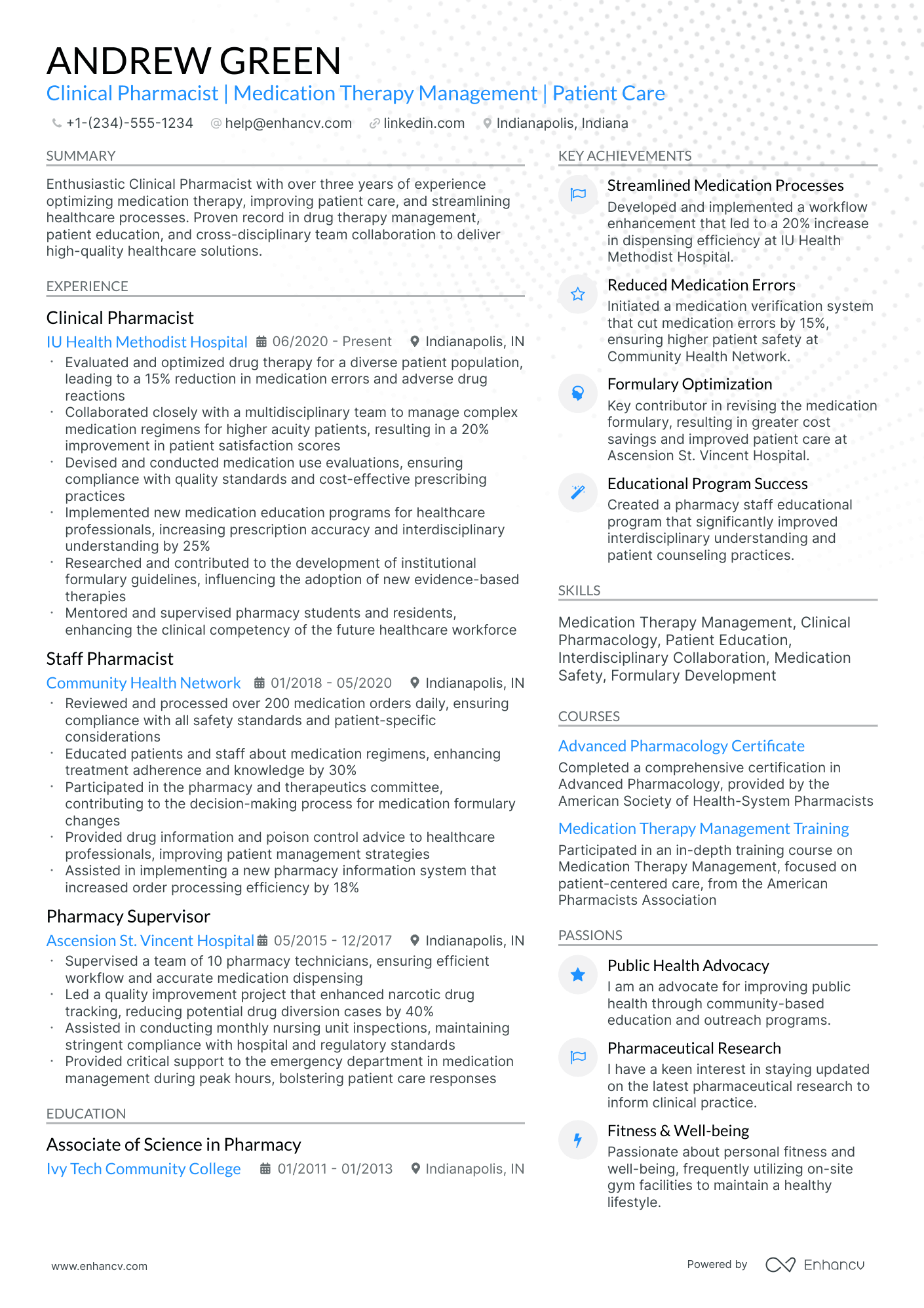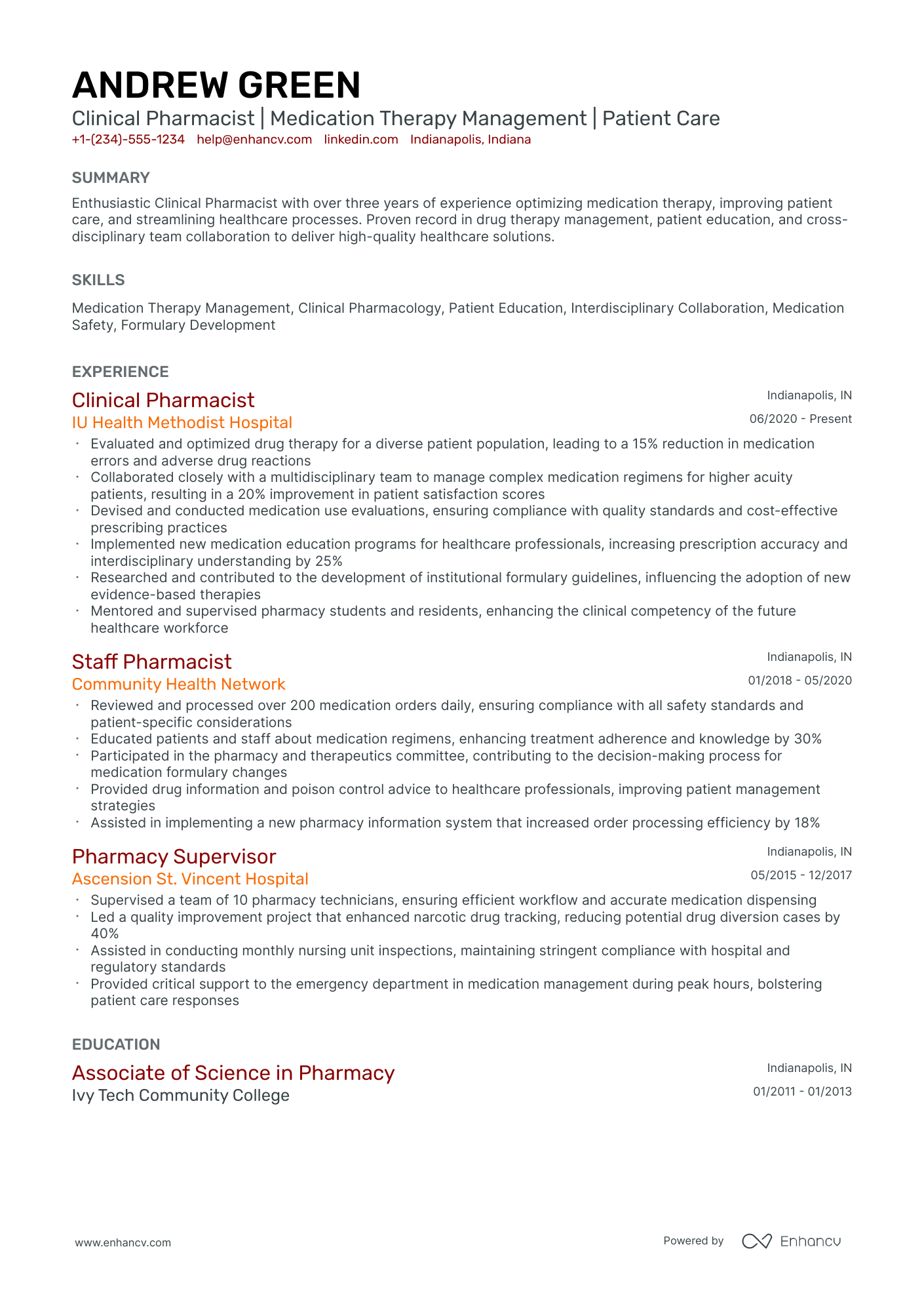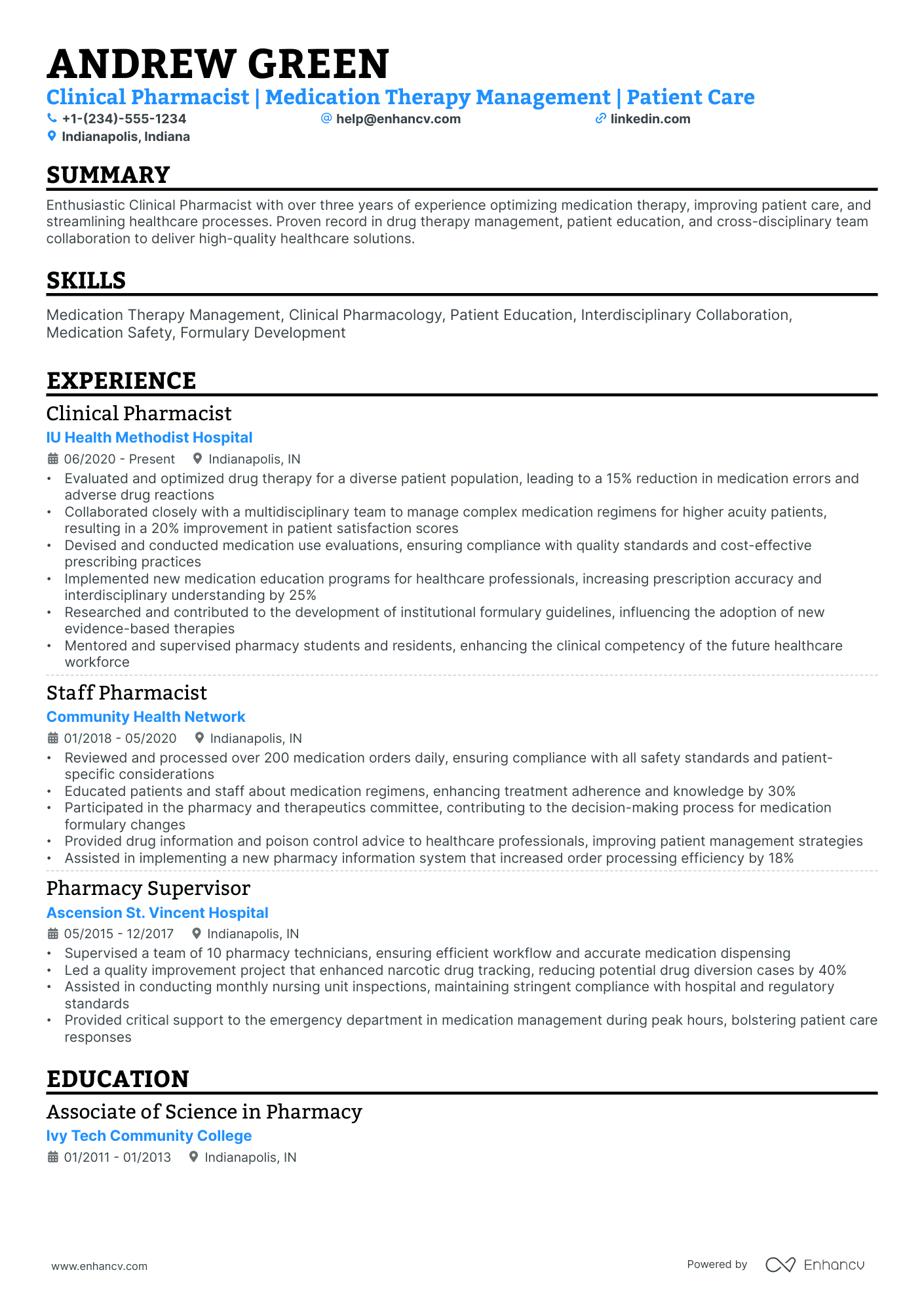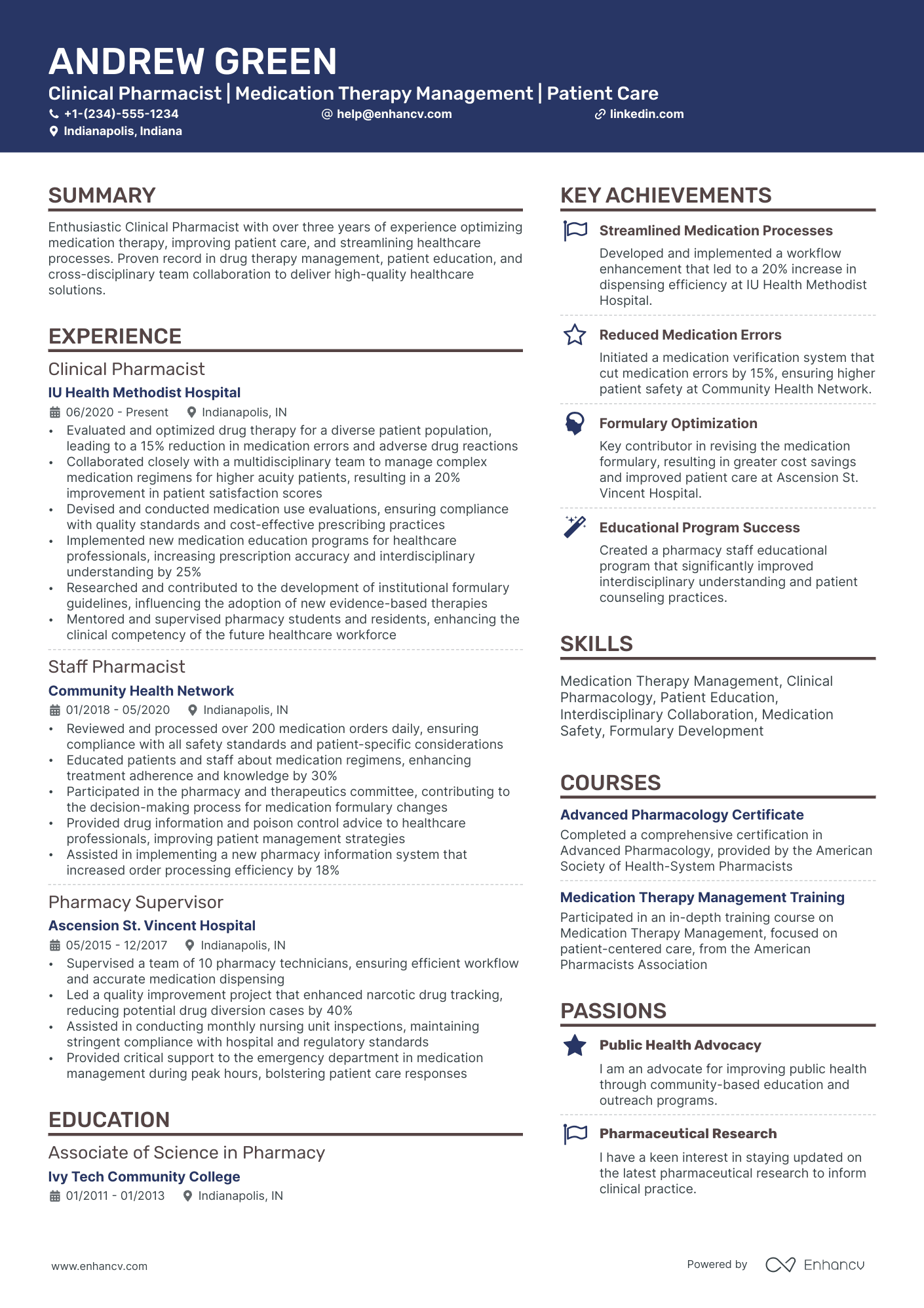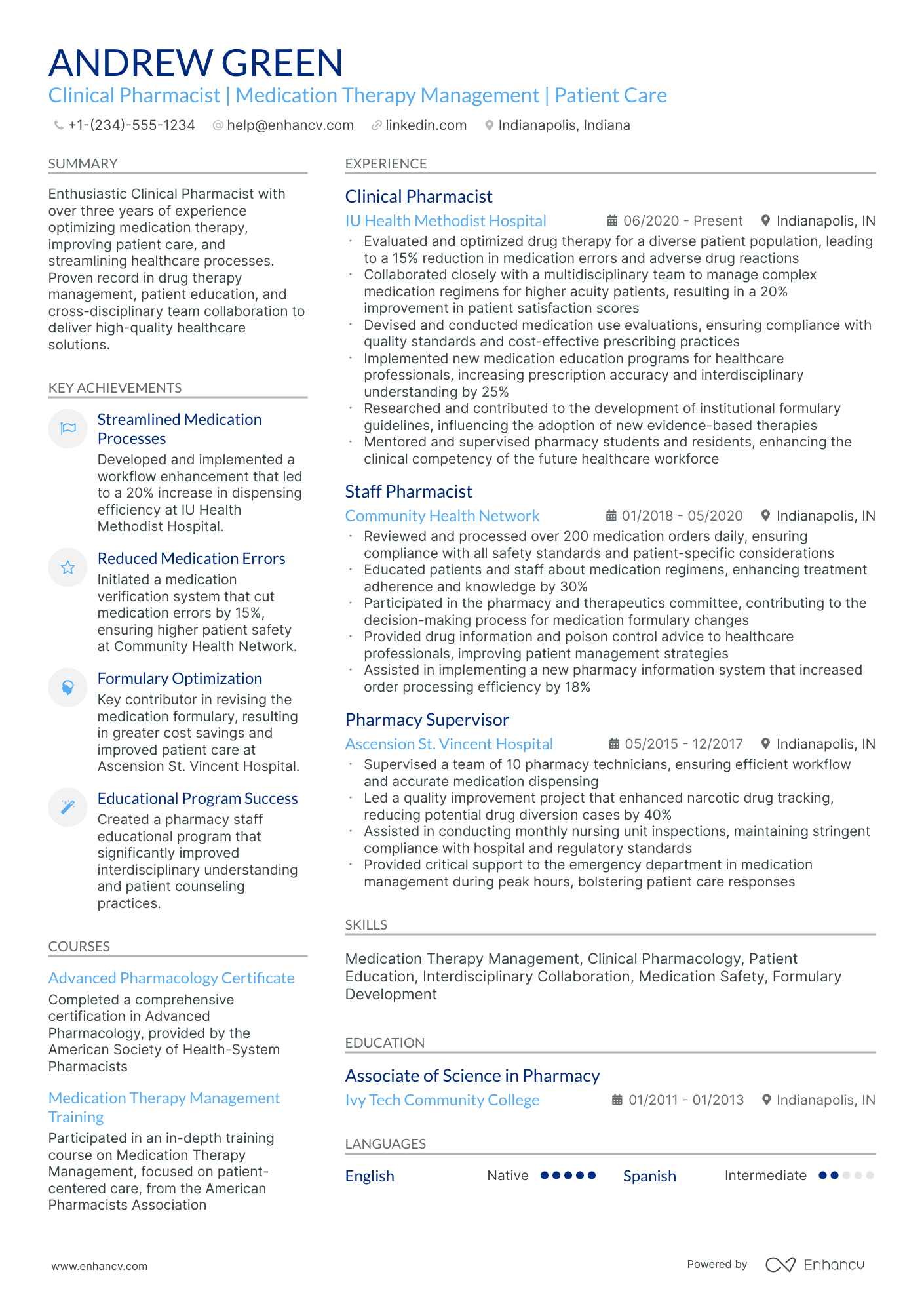Crafting a resume that effectively encapsulates your expertise in medication therapy management and patient care can be daunting for a hospital pharmacist. Our comprehensive guide provides step-by-step advice to highlight your pharmacological proficiency and patient-centered experience, ensuring you stand out to potential employers.
- Hospital pharmacist resumes that are tailored to the role are more likely to catch recruiters' attention.
- Most sought-out hospital pharmacist skills that should make your resume.
- Styling the layout of your professional resume: take a page from hospital pharmacist resume examples.
How to write about your hospital pharmacist achievements in various resume sections (e.g. summary, experience, and education).
Enhancing your hospital pharmacist resume: format and layout tips
"Less is more" - this principle is key for your hospital pharmacist resume design. It emphasizes the importance of focusing on why you're the ideal candidate. Simultaneously, it's crucial to select a resume design that is both clear and simple, ensuring your qualifications are easily readable.
Four popular formatting rules (and an additional tip) are here to optimize your hospital pharmacist resume:
- Listing experience in reverse chronological order - start with your most recent job experiences. This layout helps recruiters see your career progression and emphasizes your most relevant roles.
- Including contact details in the header - make sure your contact information is easily accessible at the top of your resume. In the header, you might also include a professional photo.
- Aligning your expertise with the job requirements - this involves adding essential sections such as experience, skills, and education that match the job you're applying for.
- Curating your expertise on a single page - if your experience spans over a decade, a two-page resume is also acceptable.
Bonus tip: Ensure your hospital pharmacist resume is in PDF format when submitting. This format maintains the integrity of images, icons, and layout, making your resume easier to share.
Finally, concerning your resume format and the Applicant Tracker System (ATS):
- Use simple yet modern fonts like Rubik, Lato, Montserrat, etc.
- All serif and sans-serif fonts are friendly to ATS systems. Avoid script fonts that look like handwriting, however.
- Fonts such as Ariel and Times New Roman are suitable, though commonly used.
- Both single and double-column resumes can perform well with the ATS.
Keep in mind the market you’re applying to – a Canadian resume, for instance, might have a unique layout.
Upload & Check Your Resume
Drop your resume here or choose a file. PDF & DOCX only. Max 2MB file size.
PRO TIP
Highlight any significant extracurricular activities that demonstrate valuable skills or leadership.
The key to your hospital pharmacist job-winning resume - present your expertise with these sections:
- A header to make your resume more scannable
- Snapshot of who you are as a professional with your resume soft skills, achievements, and summary or objective
- Job advert keywords in the skills section of your resume
- Resume experience quantifying your past job successes with metrics
- A relevant education, certification, and technical sills section to provide background to your technological/software capabilities
What recruiters want to see on your resume:
- Clinical Pharmacy Experience in a Hospital Setting
- Medication Therapy Management and Knowledge of Drug Interactions
- Pharmacy Automation Systems Proficiency and Technology Integration Skills
- Familiarity with Hospital Pharmacy Regulations and Accreditation Standards
- Experience with Interdisciplinary Healthcare Team Collaboration
Adding your relevant experience to your hospital pharmacist resume
If you're looking for a way to show recruiters that your expertise is credible, look no further than the resume experience section.
Your hospital pharmacist resume experience can be best curated in a structured, bulleted list detailing the particulars of your career:
- Always integrate metrics of success - what did you actually achieve in the role?
- Scan the hospital pharmacist advert for your dream role in search of keywords in the job requirements - feature those all through your past/current experience;
- Dedicate a bullet (or two) to spotlight your technical capabilities and how you're able to use the particular software/technology in your day-to-day roles;
- Write simple by including your responsibility, a job advert keyword or skill, and a tangible outcome of your success;
- Use the experience section to also define the unique value of working with you in the form of soft skills, relevant feedback, and the company culture you best thrive in.
Industry leaders always ensure that their resume experience section offers an enticing glimpse at their expertise, while telling a career narrative. Explore these sample hospital pharmacist resumes on how to best create your resume experience section.
- Developed and implemented a medication management system that reduced prescription errors by 30% within the first year.
- Spearheaded a collaborative initiative with the care team to optimize patient-specific pharmacotherapy plans, enhancing recovery rates.
- Managed the hospital's formulary, ensuring cost-effective procurement that saved the hospital approximately $200,000 annually.
- Oversaw a team of 10 pharmacy technicians, ensuring adherence to hospital policies and state regulations.
- Led the charge in adopting electronic health records, streamlining patient information management and reducing retrieval time by 40%.
- Championed a patient medication education program that decreased hospital readmissions due to medication non-compliance by 25%.
- Introduced an antimicrobial stewardship program that reduced unnecessary antibiotic use by 35%.
- Strategized on inventory control measures, leading to a 20% reduction in expired pharmaceutical stock.
- Participated in interdisciplinary rounds, offering vital pharmaceutical insights that impacted treatment protocols positively.
- Utilized Pharmacokinetics and Pharmacodynamics principles to tailor drug regimens, optimizing patient outcomes.
- Facilitated the integration of a new oncology drug protocol that improved patient survival rates by 15%.
- Engaged in continuous professional education to remain abreast of emerging medical therapies and integrate them into clinical practice.
- Drove the hospital's transition to a centrally-automated dispensing system, increasing efficiency by 25%.
- Contributed pharmaceutical expertise to an interdisciplinary pain management committee, resulting in a 10% improvement in patient satisfaction scores.
- Published a study in a peer-reviewed journal on drug interaction outcomes, which influenced hospital prescribing guidelines.
- Launched a continuous improvement program that led to a sustained 5% monthly decrease in medication dispensing times.
- Pioneered a remote pharmacy consultation service, extending expert advice to rural healthcare facilities.
- Conducted comprehensive medication therapy reviews, averting over 200 potential adverse drug events annually.
- Orchestrated a drug-use evaluation project that resulted in the adoption of new evidence-based prescribing standards.
- Initiated a successful cost-savings campaign by negotiating competitive prices with drug suppliers, saving the hospital $500,000 over three years.
- Enhanced patient safety by developing a compounding error prevention strategy, reducing compounding errors by 20%.
- Implemented an advanced inventory management platform that reduced drug waste, resulting in annual savings of $100,000.
- Provided crucial pharmaceutical consultations during emergency situations, playing a pivotal role in life-saving decisions.
- Led a vaccination outreach program that increased community flu vaccinations by 45%.
- Expertly managed the provision of pharmaceutical care to patients in critical care units, enhancing therapeutic efficacy.
- Conceived and deployed a staff training module on pharmacovigilance that improved reporting compliance by 60%.
- Actively participated in the design of a drug recycling program that conserved resources and reduced environmental impact.
- Aligned pharmacy services with the hospital’s strategic plan, supporting expansion efforts and improving service line efficiency.
- Facilitated the integration of pharmacogenomics into routine patient care, personalizing treatments and enhancing drug efficacy.
- Mentored junior pharmacists and technicians, contributing to a culture of excellence and continuous learning within the department.
The following content includes information from "O*NET OnLine" by the U.S. Department of Labor, Employment and Training Administration (USDOL/ETA). Used under the CC BY 4.0 license. The data represents the top responsibilities present on the task lists for hospital pharmacist professionals.
Top Responsibilities for Hospital Pharmacist:
- Review prescriptions to assure accuracy, to ascertain the needed ingredients, and to evaluate their suitability.
- Provide information and advice regarding drug interactions, side effects, dosage, and proper medication storage.
- Maintain records, such as pharmacy files, patient profiles, charge system files, inventories, control records for radioactive nuclei, or registries of poisons, narcotics, or controlled drugs.
- Collaborate with other health care professionals to plan, monitor, review, or evaluate the quality or effectiveness of drugs or drug regimens, providing advice on drug applications or characteristics.
- Plan, implement, or maintain procedures for mixing, packaging, or labeling pharmaceuticals, according to policy and legal requirements, to ensure quality, security, and proper disposal.
- Order and purchase pharmaceutical supplies, medical supplies, or drugs, maintaining stock and storing and handling it properly.
- Compound and dispense medications as prescribed by doctors and dentists, by calculating, weighing, measuring, and mixing ingredients, or oversee these activities.
- Advise customers on the selection of medication brands, medical equipment, or healthcare supplies.
- Teach pharmacy students serving as interns in preparation for their graduation or licensure.
- Provide specialized services to help patients manage conditions, such as diabetes, asthma, smoking cessation, or high blood pressure.
Quantifying impact on your resume
- Mention the number of medication reviews conducted to ensure patient safety and reduce drug-related problems.
- Quantify the inventory management improvements made, such as reducing medication waste by a certain percentage.
- Include the volume of prescriptions processed daily, showcasing capacity for high-throughput environments.
- Highlight any cost-saving initiatives implemented, with specifics on the amount of money saved annually for the hospital.
- List the number of interdisciplinary team meetings attended, emphasizing collaborative care contribution.
- Document the number of clinical protocols developed or revised, demonstrating impact on patient care practices.
- Specify the reduction in medication errors achieved through vigilance and protocol adjustment.
- Report on the number of educational sessions provided to healthcare staff, illustrating a commitment to continuous learning and improvement.
Action verbs for your hospital pharmacist resume
Remember these four tips when writing your hospital pharmacist resume with no experience
You've done the work - auditing the job requirements for keywords and have a pretty good idea of the skill set the ideal candidate must possess.
Yet, your professional experience amounts to a summer internship .
Even if you have limited or no professional expertise that matches the role you're applying for, you can use the resume experience section to:
- List extracurricular activities that are relevant to the job requirements. Let's say you were editor-in-chief of your college newspaper or part of the engineering society. Both activities have taught you invaluable, transferrable skills (e.g. communication or leadership) that can be crucial for the job;
- Substitute jobs with volunteer experience. Participating in charity projects has probably helped you develop an array of soft skills (e.g. meeting deadlines and interpersonal communications). On the other hand, volunteering shows potential employers more about you: who you are and what are the causes you care about;
- Align job applications with your projects. Even your final-year thesis work could be seen as relevant experience, if it's in the same industry as the job you're applying for. Ensure you've listed the key skills your project has taught you, alongside tangible outcomes or your project success;
- Shift the focus to your transferrable skills. We've said it before, but recruiters will assess your profile upon both job requirements and the skills you possess. Consider what your current experience - both academic and life - has taught you and how you've been able to develop your talents.
Recommended reads:
PRO TIP
The more time and effort you've put into obtaining the relevant certificate, the closer to the top it should be listed. This is especially important for more senior roles and if the company you're applying for is more forward-facing.
Creating your hospital pharmacist resume skills section: balancing hard skills and soft skills
Recruiters hiring for hospital pharmacist roles are always keen on hiring candidates with relevant technical and people talents. Hard skills or technical ones are quite beneficial for the industry - as they refer to your competency with particular software and technologies. Meanwhile, your soft (or people) skills are quite crucial to yours and the company's professional growth as they detail how you'd cooperate and interact in your potential environment. Here's how to describe your hard and soft skill set in your hospital pharmacist resume:
- Consider what the key job requirements are and list those towards the top of your skills section.
- Think of individual, specific skills that help you stand out amongst competitors, and detail how they've helped you succeed in the past.
- Look to the future of the industry and list all software/technologies which are forward-facing.
- Create a separate, technical skills section to supplement your experience and further align with the hospital pharmacist job advert. Find the perfect balance between your resume hard and soft skills with our two lists.
Top skills for your hospital pharmacist resume:
Pharmaceutical Compounding
Medication Therapy Management
Pharmacy Management Software
Electronic Health Records (EHR)
Drug Interaction Analysis
Clinical Pharmacokinetics
Inventory Management Systems
Pharmaceutical Calculations
Patient Counseling Techniques
Regulatory Compliance Knowledge
Communication Skills
Attention to Detail
Problem-Solving Skills
Empathy
Team Collaboration
Time Management
Critical Thinking
Adaptability
Interpersonal Skills
Organizational Skills
Next, you will find information on the top technologies for hospital pharmacist professonals from "O*NET OnLine" by the U.S. Department of Labor, Employment and Training Administration (USDOL/ETA). Used under the CC BY 4.0 license.
Top technologies for Hospital Pharmacist’s resume:
- eClinicalWorks EHR software
- Epic Systems
- Microsoft PowerPoint
- Healthprolink MedAtlas
- Recordkeeping software
PRO TIP
Highlight any significant extracurricular activities that demonstrate valuable skills or leadership.
Certifications and education: in-demand sections for your hospital pharmacist resume
Your academic background in the form of certifications on your resume and your higher degree education is important to your application.
The certifications and education sections pinpoint a variety of hard and soft skills you possess, as well as your dedication to the industry.
Add relevant certificates to your hospital pharmacist resume by:
- Add special achievements or recognitions you've received during your education or certification, only if they're really noteworthy and/or applicable to the role
- Be concise - don't list every and any certificate you've obtained through your career, but instead, select the ones that would be most impressive to the role
- Include the name of the certificate or degree, institution, graduation dates, and certificate license numbers (if possible)
- Organize your education in reverse chronological format, starting with the latest degree you have that's most applicable for the role
Think of the education and certification sections as the further credibility your hospital pharmacist resume needs to pinpoint your success.
Now, if you're stuck on these resume sections, we've curated a list of the most popular technical certificates across the industry.
Have a look, below:
The top 5 certifications for your hospital pharmacist resume:
- Board Certified Pharmacotherapy Specialist (BCPS) - Board of Pharmacy Specialties (BPS)
- Board Certified Oncology Pharmacist (BCOP) - Board of Pharmacy Specialties (BPS)
- Board Certified Infectious Diseases Pharmacist (BCIDP) - Board of Pharmacy Specialties (BPS)
- Board Certified Critical Care Pharmacist (BCCCP) - Board of Pharmacy Specialties (BPS)
- Certified Geriatric Pharmacist (CGP) - Board of Pharmacy Specialties (BPS) or Commission for Certification in Geriatric Pharmacy (CCGP)
The content below includes information from "O*NET OnLine" by the U.S. Department of Labor, Employment and Training Administration (USDOL/ETA). Used under the CC BY 4.0 license. The data represents the top associations for hospital pharmacist professionals.
Top US associations for a Hospital Pharmacist professional
- Accreditation Council for Pharmacy Education
- American Association of Colleges of Pharmacy
- American Association of Diabetes Educators
- American Association of Pharmaceutical Scientists
- American College of Clinical Pharmacy
PRO TIP
If you happen to have some basic certificates, don't invest too much of your hospital pharmacist resume real estate in them. Instead, list them within the skills section or as part of your relevant experience. This way you'd ensure you meet all job requirements while dedicating your certificates to only the most in-demand certification across the industry.
Recommended reads:
Practical guide to your hospital pharmacist resume summary or objective
First off, should you include a summary or objective on your hospital pharmacist resume?
We definitely recommend you choose the:
- Resume summary to match job requirements with most noteworthy accomplishments.
- Resume objective as a snapshot of career dreams
Both the resume summary and objective should set expectations for recruiters as to what your career highlights are.
These introductory paragraphs (that are no more than five sentences long) should help you answer why you're the best candidate for the job.
Industry-wide best practices pinpoint that the hospital pharmacist resume summaries and objectives follow the structures of these samples:
Resume summaries for a hospital pharmacist job
- With over a decade of experience at a leading metropolitan hospital, I've honed a skill set that includes expert knowledge in medication therapy management, clinical pharmacokinetics, and the development of targeted drug protocols. My tenure has been marked by initiating a hospital-wide antimicrobial stewardship program that resulted in a 30% reduction in inappropriate antibiotic usage.
- Seasoned pharmaceutical sales professional with 8 years of experience, transitioning into hospital pharmacy to leverage my substantial expertise in medication sales and consulting. I bring a comprehensive understanding of drug interaction, patient safety protocols, and an unparalleled commitment to patient care. My success includes increasing market share by 25% for a top-tier pharma company through strategic educational contributions.
- Formerly a clinical researcher with a PhD in Pharmacology, I am pursuing a hospital pharmacist position to apply my rigorous scientific background and 5 years of experience conducting clinical trials. I offer advanced analytical abilities, a thorough understanding of biochemistry and molecular pharmacology, and a track record of publishing in peer-reviewed journals.
- As I transition from a distinguished 15-year career in community pharmacy management to a hospital pharmacy setting, I bring a wealth of knowledge in patient counseling, drug utilization review, and developing pharmacy workflow optimizations. My crowning achievement includes leading a pharmacy team that was awarded for the highest patient satisfaction ratings in the region for three consecutive years.
- Eager to embark on a career as a hospital pharmacist, I am dedicated to mastering the intricacies of pharmacotherapy and applying the latest evidence-based practices. With a recent doctorate in pharmacy, I am committed to ensuring optimal medication outcomes and aspire to contribute to clinical research projects that aim to advance patient care and treatment modalities.
- As a new graduate with a passion for clinical pharmacy, I am seeking to dedicate my drive and comprehensive theoretical knowledge toward excelling in a challenging and rewarding hospital pharmacy environment. My objective is to leverage my intern experience at a busy urban hospital to deliver exemplary patient care while engaging in lifelong learning and professional development.
Optimize your resume summary and objective for ATS
Drop your resume here or choose a file.
PDF & DOCX only. Max 2MB file size.
Average salary info by state in the US for hospital pharmacist professionals
Local salary info for Hospital Pharmacist.” Source: My Next Move, National Center for O*NET Development. Accessed 10/15/2024
| State | Average Salary (in USD) |
|---|---|
| US National Average | $136,030 |
| California (CA) | $160,950 |
| Texas (TX) | $134,880 |
| Florida (FL) | $134,500 |
| New York (NY) | $134,360 |
| Pennsylvania (PA) | $135,640 |
| Illinois (IL) | $135,120 |
| Ohio (OH) | $132,710 |
| Georgia (GA) | $131,440 |
| North Carolina (NC) | $135,370 |
| Michigan (MI) | $134,660 |
Four more sections for your hospital pharmacist resume
Your hospital pharmacist resume can be supplemented with other sections to highlight both your personality and efforts in the industry. Use the ones you deem most relevant to your experience (and the role):
- Awards - to celebrate your success;
- Interests - to detail what you're passionate about outside of work (e.g. music, literature, etc.);
- Publications - to show your footprint in the wider community;
- Projects - to pinpoint noteworthy achievements, potentially even outside of work.
Key takeaways
- Invest in a concise hospital pharmacist professional presentation with key resume sections (e.g. header, experience, summary) and a simple layout;
- Ensure that the details you decide to include in your resume are always relevant to the job, as you have limited space;
- Back up your achievements with the hard and soft skills they've helped you build;
- Your experience could help you either pinpoint your professional growth or focus on your niche expertise in the industry;
- Curate the most sought-after certifications across the industry for credibility and to prove your involvement in the field.
